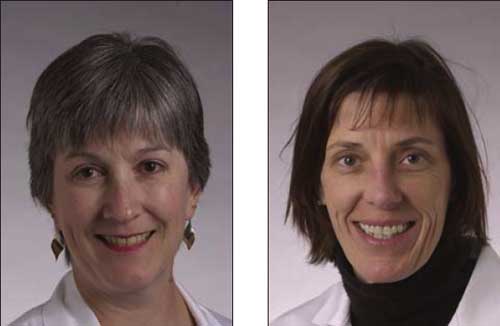Vital Signs:
Taking the time
to care for yourself
while caring for others
You would think that the combination of physician, mentor, wife, mother, and master's-degree student would be a recipe for full-blown stress. But not for Drs. Frances Brokaw, an internist, and Lisabeth Maloney, an anesthesiologist. In fact, their status as students in the M.S. program at Dartmouth's Center for the Evaluative Clinical Sciences (CECS) has been just the ticket to give the mid-career faculty members some insight into balancing work and life. Now they hope to use what they've learned to help others.

|
| Internist Fran Brokaw, left, and anesthesiologist Lib Maloney, right, tackled the topics of stress and burnout in a recent pilot study for a course. |
Burnout: As a project for one of their CECS courses, the two decided to tackle the topic of stress, burnout, and impairment among physicians. According to a 2003 American Journal of Medicine article, 37% to 47% of academic physicians are estimated to experience burnout, with even higher rates of 55% to 67% among community physicians. So Brokaw and Maloney conducted a pilot study on burnout's incidence at DHMC.
Burnout is de- fined as emotional and physical exhaustion, coupled with a sense of frustration or failure. "It is more than just having one bad day, it is an everyday type of thing," explains Brokaw. Impairment is the inability to practice at a normal level of competence, because of factors such as depression, substance abuse, or a family crisis.
Maloney's interest in the subject began with the death two years ago of a much-admired Dartmouth clinician who was determined to have succumbed to an overdose of prescription painkillers. "After his death," she says, "a group of us began to think about how we can do a better job recognizing troubles early, before they lead to impairment." DHMC leaders were already thinking about organizing a resource center to promote wellness among physicians and other health-care professionals, but "before embarking on program development," says Maloney- who as DHMC's medical director is herself one those leaders-" we wanted to get a better sense of scope and the kinds of things we could offer."
For their pilot study, Brokaw and Maloney surveyed 45 physicians in the Departments of Anesthesiology and Medicine. They sought to identify barriers to awareness and intervention, to quantify physicians' use of current resources, and to assess their willingness to try new resources. They were not surprised to find that stress is high, though no higher than national rates. What did surprise them was that although many respondents could identify burnout symptoms in themselves, they were not sure they could identify a colleague at risk of burnout.
Self-care: "How do we make it safe for the people who work the closest with physicians-nurses, secretaries, colleagues-to recognize the signs of burnout, talk to them about it, and take the next steps before something happens?" asks Brokaw. Her own interest in the subject started when she decided to earn certification in palliative medicine and learned that self-care is one of that field's requirements. "Bad things can happen anywhere, even here, to any clinician," she notes. "We're all human."
DHMC has long had a variety of support services- including an employee assistance program and a physician health committee. A wellness center-a virtual resource, not a bricks-and-mortar facility-would take advantage of all of the existing programs and tailor them to the schedules of physicians, who are often so busy caring for others that they don't take the time to care for themselves. "A large number identi- fied 'too busy/no time' as a barrier to seeking help," says Brokaw. "We need to teach physicians how to pay attention to wellness, set boundaries on work, and live healthy lifestyles."
A four-day workweek helps both Brokaw and Maloney do that. "For me, having one extra day a week was the little bit I needed to make a better balance for myself," says Maloney. "It's hard to balance work with outside activities, so you can be a whole and humane person. It's very easy to get swallowed up."
Findings: The pair presented their findings to their class in March and plan to share them with DHMC leaders as well. They identified several quick, low-cost offerings that could be initiated immediately: confidential groups to discuss practice issues, family-oriented outings, and stress-management workshops. "Our goal is to create a resource center open to any health professional," says Brokaw. "We want to create an environment in which someone can ask, 'Are you okay?'" adds Maloney.
There have already been some positive steps: Drs. Alan Green and William Torrey in the Department of Psychiatry have made a commitment to provide a rapid response whenever DHMC physicians need immediate help. "If you compare DHMC nationally, we're in a better situation than most places," says Brokaw. "This is a great place to work."
If you would like to offer any feedback about this article, we would welcome getting your comments at DartMed@Dartmouth.edu.
